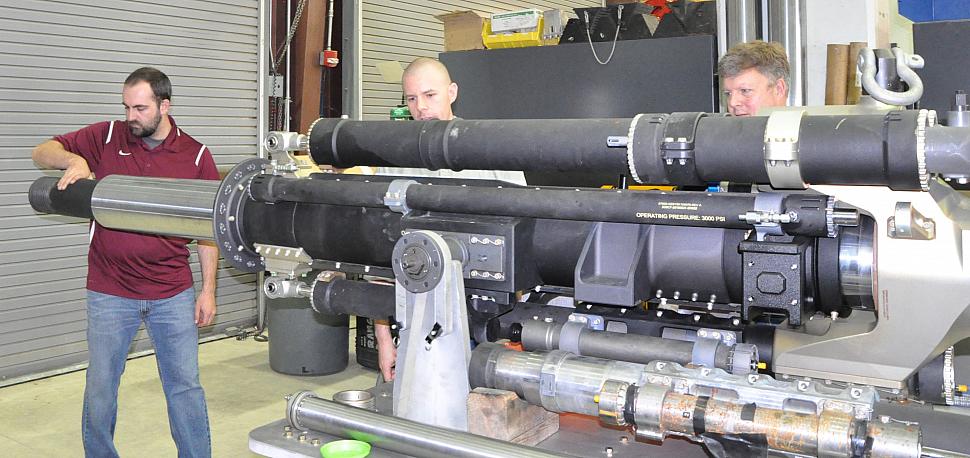C-130 News
C-130 Hercules News
NSWC Dahlgren Engineers Deliver Upgraded Gun for the AC-130
January 11, 2022 (by
NSWCDD) -
Naval Surface Warfare Center Dahlgren Division (NSWCDD) engineers designed, developed, and delivered an upgraded 105mm Gun Aircraft Unit (GAU) specifically made with the AC-130 gunship in mind.

The 105mm GAU allows warfighters on the ground to complete their missions more effectively and safely while the AC-130 provides close air support, air interdiction, and force protection.
The new weapon replaces the former gun system and positively impacts the warfighters' ability to operate and maintain the system in the field.
"This has become a much more reliable system with less maintenance," said Matthew Buckler, NSWCDD Battle Management System (BMS) Gun Weapons System lead mechanical engineer. "If we can get a system that's more reliable, that's more repeatable, that works and that allows the warfighter to complete their mission every time – that's a huge benefit for the warfighter."
From the start of the design effort, the Dahlgren engineers behind the 105 mm gun worked directly with the warfighter to get real-time feedback from experienced gunners and technicians.
Engineers on the GAU project traveled to Air Force bases Wright-Patterson, Robins, Eglin, Hurlburt Field, and Cannon throughout development for testing and direct collaboration with the warfighter. Gunners and technicians also came to Dahlgren to provide insight on the hardware's performance after testing.
"Personally, this is the most rewarding work I've done in my engineering career hands down," said Gregory Fish, NSWCDD's GAU lead analyst. "It's a fantastic place to work – an incredible sense of accomplishment and achievement. And when we get the debriefs of what the weapon effectiveness is out in the field, it makes you feel like you've done something that makes a difference because these [GAU's] are literally the tip of the spear."
The previous iteration of the AC-130's 105mm gun system comprised the M102 Howitzer and M137A1 recoil mechanism, which are no longer supported by the Army, meaning that an upgrade was necessary due to obsolescence and advancements in technologies since the original recoil mechanism was designed.
The upgrades to the 105mm GAU are sweeping, however, the engineers at Dahlgren were careful to ensure that the functionality, accuracy, and usability of the weapon remain largely the same.
Throughout the iterative design process, Buckler said the team encountered challenging yet navigable obstacles and tackled each issue as it came.
"We've described [the development process] as peeling back an onion," said Buckler. "You get the most immediate issue and solve that one. Then when you solve that one, something else becomes more important and you kind of just keep peeling it back until you've essentially solved all of your major issues and you can live with whatever the maintenance interval maybe."
When a weapon fires thousands of rounds and its recoil accelerates to 350G's, or 350 times the force of gravity, maintenance is a natural consequence of the operation. The engineers that led the GAU development also oversee the maintenance training of the warfighters.
Naval Surface Warfare Center Dahlgren engineers (left to right) Thomas Houck, Matthew Buckler, and Gregory Fish inspect the new 105mm Gun Aircraft Unit after testing. The weapon is specifically designed for the most lethal gunship, the AC-130J. [USN photo]
The new weapon replaces the former gun system and positively impacts the warfighters' ability to operate and maintain the system in the field.
"This has become a much more reliable system with less maintenance," said Matthew Buckler, NSWCDD Battle Management System (BMS) Gun Weapons System lead mechanical engineer. "If we can get a system that's more reliable, that's more repeatable, that works and that allows the warfighter to complete their mission every time – that's a huge benefit for the warfighter."
From the start of the design effort, the Dahlgren engineers behind the 105 mm gun worked directly with the warfighter to get real-time feedback from experienced gunners and technicians.
Engineers on the GAU project traveled to Air Force bases Wright-Patterson, Robins, Eglin, Hurlburt Field, and Cannon throughout development for testing and direct collaboration with the warfighter. Gunners and technicians also came to Dahlgren to provide insight on the hardware's performance after testing.
"Personally, this is the most rewarding work I've done in my engineering career hands down," said Gregory Fish, NSWCDD's GAU lead analyst. "It's a fantastic place to work – an incredible sense of accomplishment and achievement. And when we get the debriefs of what the weapon effectiveness is out in the field, it makes you feel like you've done something that makes a difference because these [GAU's] are literally the tip of the spear."
The previous iteration of the AC-130's 105mm gun system comprised the M102 Howitzer and M137A1 recoil mechanism, which are no longer supported by the Army, meaning that an upgrade was necessary due to obsolescence and advancements in technologies since the original recoil mechanism was designed.
The upgrades to the 105mm GAU are sweeping, however, the engineers at Dahlgren were careful to ensure that the functionality, accuracy, and usability of the weapon remain largely the same.
Throughout the iterative design process, Buckler said the team encountered challenging yet navigable obstacles and tackled each issue as it came.
"We've described [the development process] as peeling back an onion," said Buckler. "You get the most immediate issue and solve that one. Then when you solve that one, something else becomes more important and you kind of just keep peeling it back until you've essentially solved all of your major issues and you can live with whatever the maintenance interval maybe."
When a weapon fires thousands of rounds and its recoil accelerates to 350G's, or 350 times the force of gravity, maintenance is a natural consequence of the operation. The engineers that led the GAU development also oversee the maintenance training of the warfighters.
Courtesy of NSWCDD Corporate Communications
